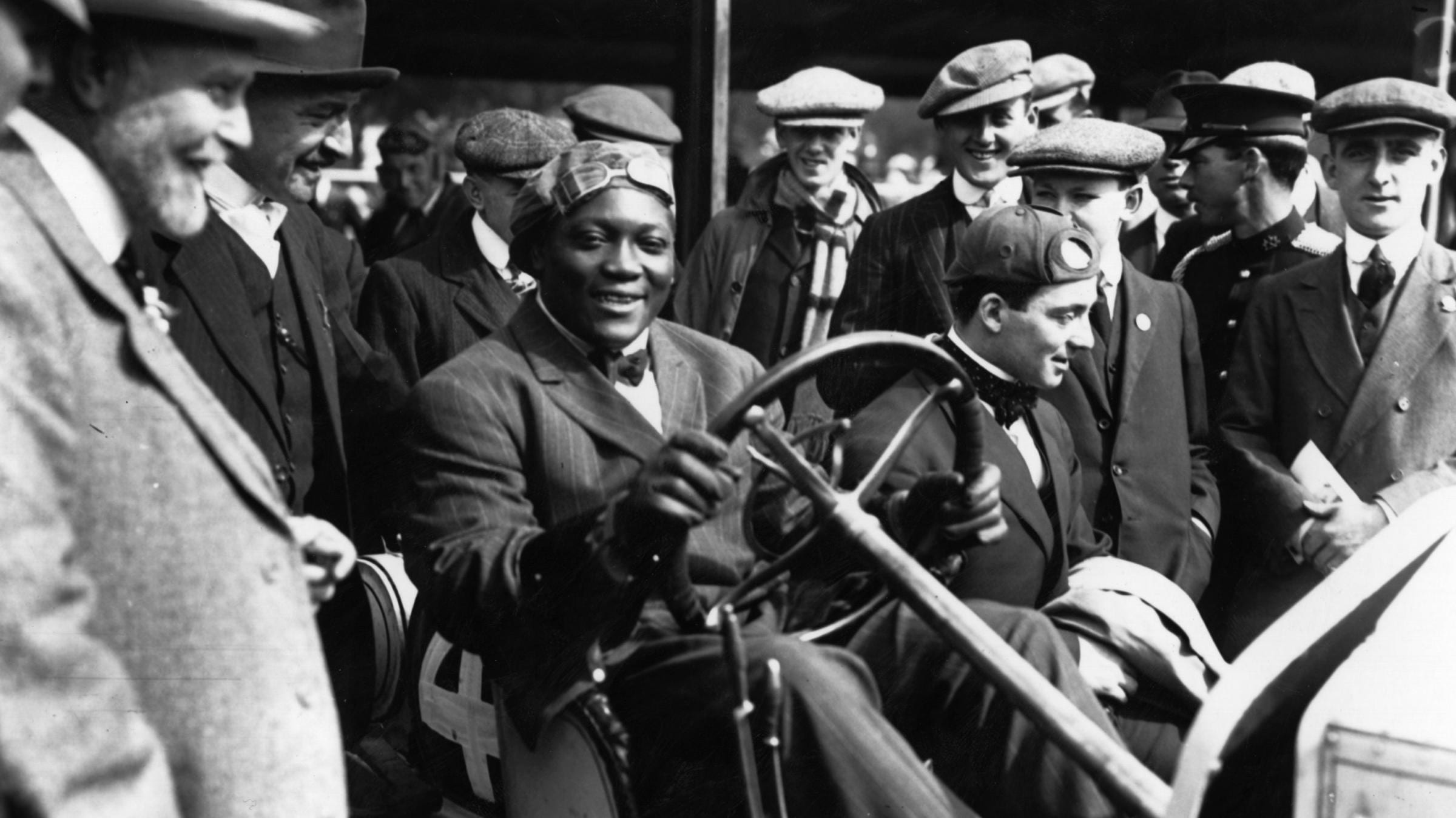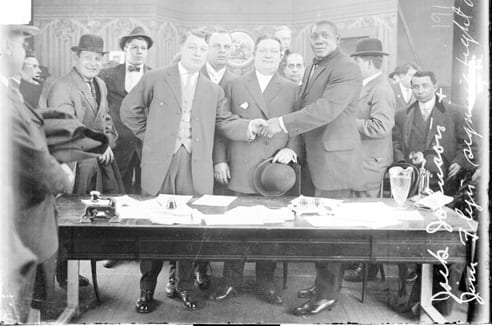
Churchill, Johnson, and the British Boxing Controversy of 1911
“The British Boxing Controversy” is excerpted from an essay for the Hillsdale College Churchill Project. For the original text including more images and endnotes, please click here. Subscriptions to this site are free. You will receive regular notices of new posts as published. Just scroll to SUBSCRIBE AND FOLLOW. Your email address is never given out and remains a riddle wrapped in a mystery inside an enigma.
Boxing, 1911
In February a Cambridge University panel of four, all sharing the same opinions, branded Winston Churchill an overrated racist imperialist. The British Empire, one speaker added, was worse than the Third Reich. In March, Policy Exchange and the Churchill Project published a point by point rebuttal by Andrew Roberts and Zewditu Gebreyohanes. One of the panelists replied in The Guardian, with a new accusation: “In 1911, Churchill banned interracial boxing matches so white fighters would not be seen losing to black ones.”
The cited source, Professor Neil Carter, did not actually make that statement. Carter wrote that Churchill as Home Secretary was pressured by “establishment figures” and declared one boxing match illegal. The action “acted as precedent for the Home Office and was used in the years to come to ban any high-profile fight between white and black boxers.”
Churchill was involved in boxing only in 1911, but the episode does illuminate his 20 months at the Home Office. (There were many interracial boxing matches in England at that time, but no other championship matches.) Readers may judge what the facts say about Churchill’s involvement in the British ban against black championship boxers.
Johnson vs. Wells
In September 1911, Lancashire promoter James White announced a championship boxing match at Earl’s Court, London on October 2nd. It pitted the world heavyweight titleholder, African-American Jack Johnson, against Billy Wells, the British contender. A purse of £8000 ($800,000 today) would be split 75% for the champion, 25% for the challenger.
Controversy erupted, though the British Isles were relatively free of race antagonism. Lord Stanhope declared it wrong for whites to attack blacks and vice-versa, fearing repercussions in the colonies, whoever won. He said the match might cause “a breach of the peace, citing contemporary events elsewhere.
Disallowing a boxing match, according to this argument, was a question of how to proceed in a tense situation, not whether one race was superior in the boxing ring. After many weary years and two wars, Britain had created the Union of South Africa. How would the match go down with the touchy Boers, who were increasingly dominating that government? Reverend F.B. Meyer of Regent’s Park Baptist Church expanded the argument: “God knows there is horror enough in the Southern States of America, trouble enough between ourselves, the settlers, in South Africa and the black population….”
Piling on
Such opinions reflected current events. In 1910, Jack Johnson had defeated former heavyweight boxing champion James L. Jeffries in Reno, Nevada. Afterward, race riots had broken out in the U.S., a sorry episode in the country’s history. On the positive side, Johnson’s boxing had encouraged black Americans. Reno caused poet William Waring Cuney to write his poem “My Lord, What a Morning.”
Rev. Meyer had no record of prejudice and had previously espoused black initiatives in London. But he feared violence following a Johnson-Wells match. Various bishops, head masters, MPs, lord mayors, and Baden-Powell of the Boy Scouts agreed. Some objected to paying men vast sums of money for brutalizing each other.
The question was whether to allow a match which people ought not to interpret divisively and yet in fact would. The police, “keenly alive to the fact that such matches often degenerate into fights, which break the bounds of legality, [warned] the organizers of their personal liability.” Lord Lonsdale, president of the National Sporting Club, thought the contest lopsided. Johnson’s 75% share of the purse, he said, showed that he was three times better than Wells.
Then there was a contractual objection. Jack Johnson had signed a contract to appear at London’s Hippodrome during the Earl’s Court match. Johnson claimed he had cancelled that contract, although the Variety Theatres Control Association disagreed and filed for breach.
Champion and challenger

Jack Johnson, the “Galveston Giant,” was a vivid character who motivated both supporters and detractors. He enjoyed fine dining, tailored clothes, lavish gifts to friends, and fast cars. (Stopped for speeding, which in these days required paying one’s fine on the spot, he handed the officer a $100 bill. The policeman said he couldn’t make change. Johnson told him to keep it, since he’d be coming back at the same speed.)
Johnson was one of the first athletes to make money with endorsements and namesake businesses. He opened two “black and tan” desegregated night clubs. He also developed critics. Civil rights leader Booker T. Washington said it was “unfortunate that a man with money should use it in a way to injure his own people…. Johnson’s actions did not meet my personal approval and I am sure they do not meet with the approval of the colored race.”
By contrast “Bombardier” Billy Wells was little known. He began boxing as a soldier in the Royal Artillery in 1906. Deciding to go professional, he left the Army and took the British heavyweight title 1911. No one thought he could beat Jack Johnson.
Enter Churchill
Rev. Meyer gathered signatures for a “memorial” to Home Secretary Churchill, asking him to stop the fight. Young Winston was visiting the King and Prime Minister Asquith in Scotland, where Asquith was offering him a post he craved: the Admiralty. In his last month at the Home Office, the last thing he needed was furor over a boxing match.
Solicitor-General Sir John Simon offered to short-circuit the controversy: deny Johnson entry to England. Churchill replied that Johnson had every right to come. He promised to give the memorial “close attention.” The Galveston Giant was determined. “We have signed to box under NSC rules,” he declared. “If they stop this fight, England cannot claim again she is the nation that allows fair play.” Johnson arrived in London on September 23rd.
The next day the Home Office declared the fight “illegal, as a breach of the peace and counter to the best interests of the nation and empire.” But as The Sporting News recorded, this was not the final word:
On first reading…it would appear that Mr. Churchill had vetoed the contest. But we have official authority for saying that such is not the case. The Home Secretary has shifted the real responsibility for the decision which shall settle whether the match is to go on or not to the shoulders of the Bow Street magistrate. It not as a judicial authority, but as the head of the department responsible for law and order in this country, that Mr. Churchill has ruled that “what is contemplated is illegal.” He gives no reasons for coming to this decision…
Jack Johnson as barrister
Johnson, Wells and promoter White were charged with “aiding, counselling, abetting to commit a breach of the peace.” Johnson acted as his own attorney. Cross-examining Police Superintendent Duncan Mclntyre, he showed himself as good a lawyer as he was a boxer. The dialogue reminds me of a Joe Pesci cross-examinination in My Cousin Vinny:
Johnson: “Are you familiar with the Marquess of Queensberry rules?”
McIntyre: “No, not very familiar.”
Johnson: “How do you know that if Johnson and Mr. Wells box on October 2 there will be a breach of the peace?”
McIntyre: “I say I apprehend there will be a breach of the peace.”
Johnson: “Have you ever seen a boxing contest?”
McIntyre: “No.”
Johnson: “You have no idea what they are?”
McIntyre: “No.”
Johnson: “The witness may go: I am through.”
As Johnson embarrassed McIntyre, England’s High Court granted an injunction preventing the Earl’s Court lessees, and James White, from holding the fight. The court said the boxing match would go against the terms of the lease, which stated that all exhibitions “shall be of a high class and be conducted with due regard to the maintenance of order…or in any way injuriously affect any of the licenses in force for the premises.”
Upshot
Churchill did not “ban interracial boxing matches so white fighters would not be seen losing to black ones.” Nor did he initiate the Johnson-Wells controversy. As Home Secretary, he recalled what had occurred in Reno, the practical considerations of which he may have had in view. History does not give us documentation of his motivations—only of multiple and conflicting motives of those around him, and the decision he issued.
One may fault his “executive ruling” as sloughing off the judicial decision to the courts. Their decisions, as Professor Carter noted, offered a precedent for later Home Secretaries to stop white-black championship bouts, an injustice to black boxers. Ironically, Johnson in his day contributed to the dearth of black challengers by preferring white opponents because, he said, there was more money in it.
The new Union of South Africa “made everybody nervous,” wrote Theresa Rundstedtler, even though “colour feeling was still largely unknown in British Isles. The British liberal concept of imperial citizenship marked by civilization, rather than color, seemed inapplicable, if not naïve, in this modern context.”
Retrospective
Jack Johnson, who had once hoped to live in Britain, was outraged: “You are funny people, you English, I cannot make you out at all. You call the black man your brother; you say he is equal with you; that we’re all one family. I must say you’ve got a queer way of showing your brotherly feelings.” The UK did not lift its championship color bar until 1948.
Not all boxing was like this. Indeed, African-American Joe Louis was famous for his 1938 defeat of Max Schmeling, a German who claimed that as an Aryan he could not be defeated. Louis went on to an unparalleled streak as World Heavyweight Champion from 1937 to 1949, admired by schoolboys white and black, including this writer.
Jack Johnson held his boxing title until 1915. In 1913 he was arrested on spurious charges and sentenced to a year in jail. He broke bail and lived abroad, until voluntarily surrendering in 1920. After a year in prison, he resumed his variegated career, even became a recording star.
Flaming out with a bang in 1945, the 67-year-old Galveston Giant reentered the ring with an old rival to help sell war bonds. He’d once said the U.S. never gave him a square deal, but he gave the U.S. a square deal when she was threatened in the Second World War. The following year Johnson died in North Carolina. Refused service at a segregated diner, he’d driven away angrily and crashed his car.
Posthumous attempts were made to pardon Jack’s 1913 conviction. In 2018, following the urgings of Mike Tyson, Harry Reid and John McCain, Donald Trump granted Johnson a presidential pardon. Cynics said it was the only matter they all agreed about. If so, it was a good thing.
Acknowledgement
Thanks to Madelin Evans of the Churchill Archives Centre for kind assistance in research.






